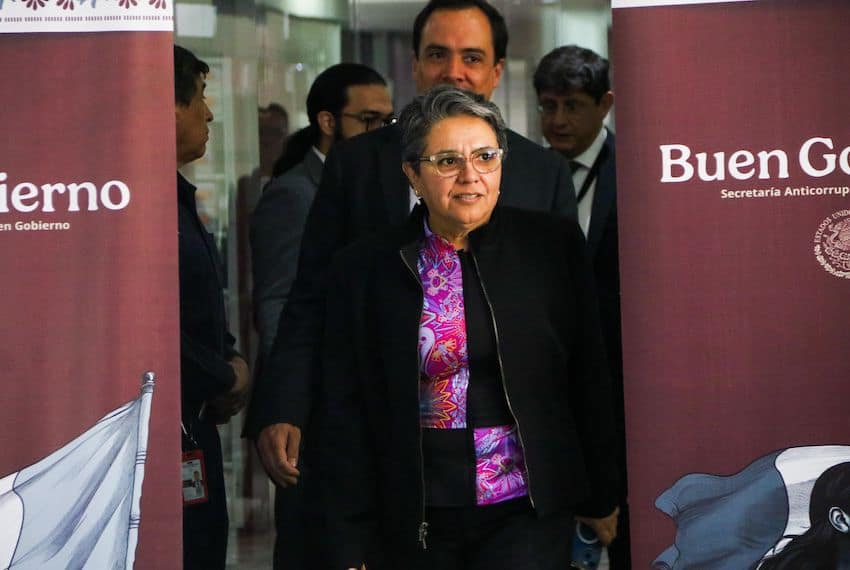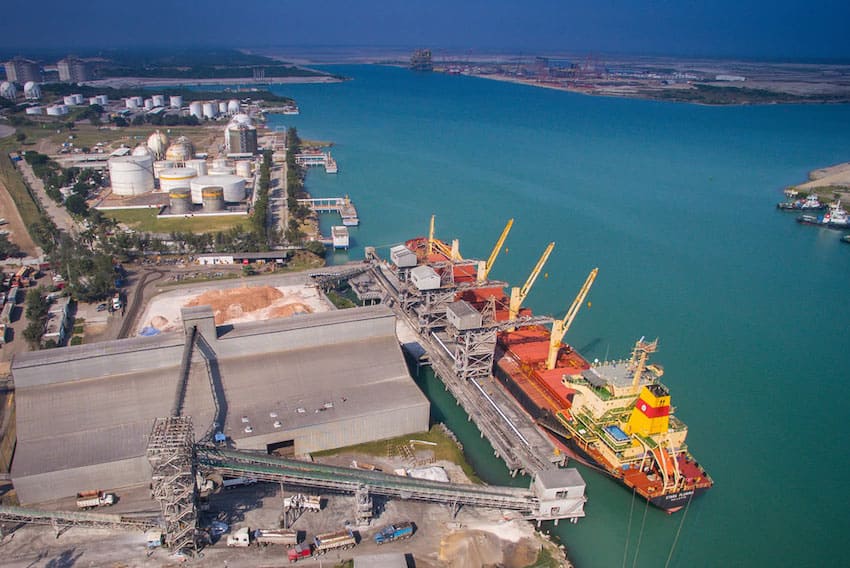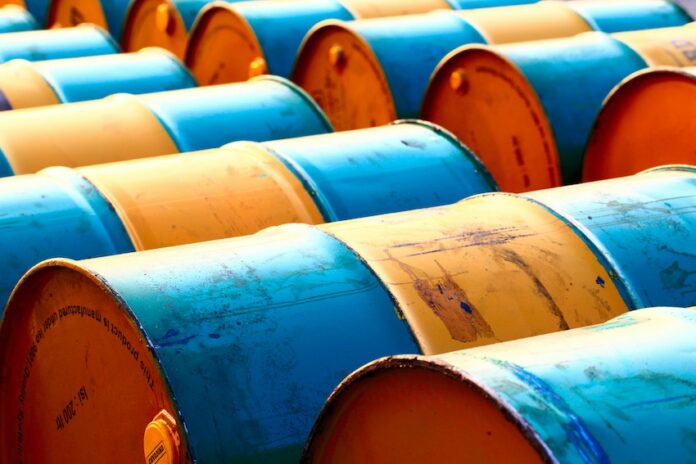In collusion with customs agents and the merchant marine, transnational corporations have brought large quantities of fuel into Mexico without paying the IEPS excise tax, resulting in lost revenue of around 1 billion pesos per shipment, according to the federal government’s top anti-corruption official.
In an interview with the newspaper El Universal’s program Con los de Casa last week, the federal Anti-Corruption and Good Government Minister Raquel Buenrostro said that transnational companies have avoided paying IEPS excise tax on shipments of gasoline and diesel because they “report” the fuel as “vegetable oil or lubricants,” or “any other product” that is not subject to the IEPS — the Special Tax on Production and Services.
She said that “each unloading” of a shipment of fuel for which the IEPS is not paid costs tax authorities a seemingly incredulous amount of around 1 billion pesos (US $51.7 million).
“We’re talking about a well-designed, sophisticated scheme in which customs agents and even high-ranking managers in certain companies participate,” Buenrostro said in a separate press conference.
She described the practice as “technical smuggling.”
It is also known as “huachicol fiscal,” — fiscal fuel theft, or tax-robbed fuel.
Huachicol is a colloquial term for stolen fuel in Mexico, huachicoleo is fuel theft and huachicoleros are fuel thieves. Fuel is most commonly stolen in Mexico via illegal taps on Pemex pipelines.
Fuel on which tax is evaded comes into Mexico via its seaports and its land border with the United States, especially that with Texas, the largest fuel-producing state in the U.S.

“We’re trying to be prudent because we don’t … [want] to cause chaos in the market, but we do want justice to be served,” she said.
Buenrostro previously noted that Vitol, a Switzerland-based Dutch energy multinational, is among the companies that have been accused of evading Mexican taxes on imported fuel.
Citing estimates from the Energy and Economy ministries and the federal tax agency SAT, El Universal reported that if the evasion of Mexico’s value-added tax (IVA) and the IEPS on imports of gasoline and diesel was stopped, an additional 100 billion pesos (US $5.2 billion) would flow into federal coffers each year.
Buenrostro, a former tax agency chief nicknamed the “Iron Lady,” said that SAT filed fuel smuggling complaints with the Federal Attorney General’s Office (FGR) and a special prosecutor’s office during the 2018-24 presidency of Andrés Manuel López Obrador.
She explained that complaints against government officials were filed with the special prosecutor’s office tasked with investigating crimes in which public servants were allegedly involved.
The anti-corruption minister said that none of the fuel smuggling cases SAT reported have been resolved.
“No progress has been made,” she said, adding that the ministry she leads doesn’t have any documents relating to new fuel smuggling complaints filed since President Claudia Sheinbaum took office last October.
In a recent press conference, Buenrostro said that “Vitol is only a representative case,” stressing that “there are other companies that are being investigated” for tax evasion on fuel imports.
The news website Infobae reported that Vitol “has already been investigated for acts of corruption and bribery in Mexico,” but it has not been convicted of any crime.

Citing an investigation by the Naval Intelligence Unit of the Navy Ministry, El Universal reported last month that “a smuggling network” that brings gasoline into Mexico from the United States “operates at at least four Mexican ports: Altamira and Tampico in Tamaulipas; Ensenada in Baja California; and Guaymas in Sonora.”
“Authorities and directors at institutions and companies … are involved: the exporters, the importers, the shipping companies, the customs and tax authorities at ports, the distributors and the gas station owners that sell this illegal fuel at lower prices,” El Universal said.
‘Unfair competition for Pemex’
Buenrostro said that transnational companies’ evasion of tax on imported shipments of fuel in recent years doesn’t just lead to a loss of tax revenue but also represents “unfair competition for Pemex,” Mexico’s state-owned oil company, and “other legal importers of fuel.”
“In addition, because it is unregulated fuel, it also poses safety and environmental risks,” she said.
Buenrostro said that the government was considering a reform to the Hydrocarbons Law to tighten controls on fuel import permits, as well as other measures to prevent the evasion of tax on gasoline and diesel brought into the country.
“We’re not going to allow the state to continue being harmed by such shameless [tax] evasion schemes,” she said.
Buenrostro said that “the intention” of Mexican authorities “is not to go against foreign investment, but rather demand that [foreign companies] comply with the law like any national company.”
The Mexican government has already dealt some significant blows to illegal fuel trafficking networks, including in March when 10 million liters of diesel were seized from a Singapore-flagged ship that arrived at the port of Tampico, allegedly transporting lubricating oil additives.
Navy seizes over 17 million liters of stolen fuel in double ‘huachicol’ busts
According to the news website La Silla Rota, Francisco Barnés de Castro, a former chief of Mexico’s Energy Regulatory Commission, led a recent study that found that huachicol fiscal has increased “alarmingly” in Mexico and become a “direct threat” to public finances and the “formal” energy sector.
Fuel imported to Mexico on which the IEPS excise tax wasn’t paid is sold at a cheaper price, putting companies that do pay their taxes at a disadvantage, according to Barnés de Castro. He claimed that there has been a lack of political will and government action to combat the problem.
Barnés de Castro called for a strengthening of “customs supervision” and the application of “criminal penalties” to discourage the technical smuggling of fuel, according to La Silla Rota.
Murders, disappearances and ‘a complex web of institutional protection’
Infobae reported on Monday that the “huachicol fiscal” scheme in Mexico has left “a trail of murders, disappearances, suspicious contracts and a complex web of institutional protection.”
“… This [scheme] operates with [phony] invoices, customs agents and administrative offices that legalize illegality from customs and borders,” the news website said.
Infobae said that Sergio Carmona Angulo, dubbed “El Rey de Huachicol” (The King of Stolen Fuel), was a central player in the tax evasion scheme. He was murdered in Nuevo León in 2021, but “the machinery” of the illicit scheme “didn’t stop,” the news website said.
“Businesspeople, carriers and operators continue moving fuel through customs with evasion mechanisms that remain active today,” Infobae said, adding that the practice has cost Mexico more than 500 billion pesos in lost tax revenue in recent years.
Infobae reported on the murder and disappearance of other people allegedly linked to hauchicol fiscal in Mexico. It also said that “several politicians and high-level officials have been pointed out for their closeness to Carmona.”
Among those mentioned by Infobae are Tamaulipas Governor Américo Villarreal Anaya and Mario Delgado Carrillo, the current federal education minister and former president of Morena, Mexico’s ruling party.
Infobae reported that Villarreal, who took office in 2022, “was linked to electoral funding” provided by Carmona and took flights on aircraft owned by the now-deceased “King of Stolen Fuel.”
It noted that Xochitl Gálvez, a former senator and presidential candidate in 2024, “revealed” in 2023 that Delgado “traveled on aircraft owned by Carmona during [election] campaigns in the north of the country.”
Criminal organizations such as the Jalisco New Generation Cartel are also allegedly involved in illicit fuel schemes, including the smuggling of stolen crude oil from Mexico into the United States.
Mexican cartels are alleged to have co-conspirators on the other side of the border.
As Mexico News Daily reported in late April, a Utah couple and their two sons are facing federal charges in the United States for allegedly smuggling US $300 million worth of crude oil from Mexico in collaboration with Mexican criminal organizations.
With reports from El Universal, Infobae and La Silla Rota
